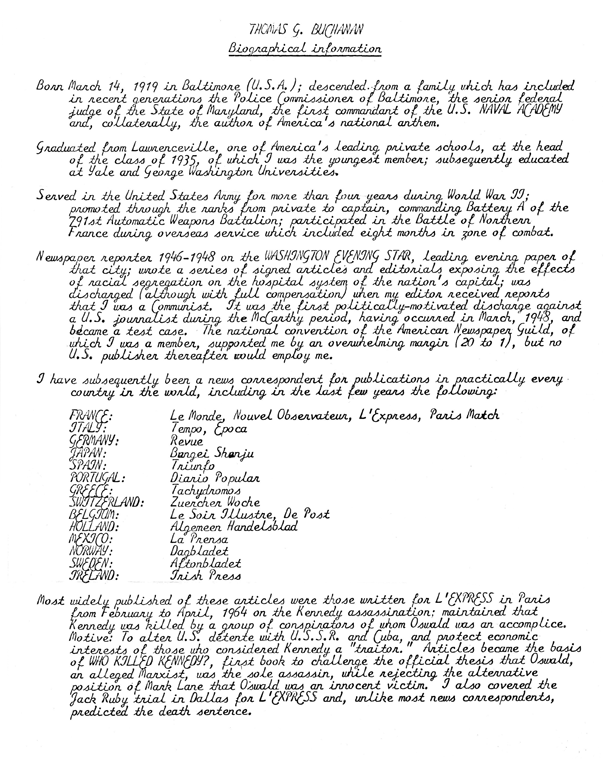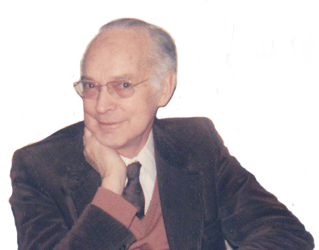I found this typewritten sheet while searching through my personal boxes of old letters. It has no date, so I’m not sure at what time in his life my father wrote it. I imagine (but am just guessing) that it was intended to be given to publishers and TV or radio interviewers who might wish to know how to introduce my father or his writings. I thought seeing his biographical notes in his own words would add insight into my father’s sense of what was noteworthy.
(If you find it hard to read, see the transcript below the image.)

THOMAS G. BUCHANAN
Biographical information
Born March 14, 1919 in Baltimore (U.S.A.); descended from a family which has included in recent generations the Police Commissioner of Baltimore, the senior federal judge of the State of Maryland, the first commandant of the U.S. NAVAL ACADEMY and, collaterally, the author of America’s national anthem.
Graduated from Lawrenceville, one of America’s leading private schools, at the head of the class of 1935, of which I was the youngest member; subsequently educated at Yale and George Washington Universities.
Served in the United States Army for more than four years during World War II; promoted through the ranks from private to captain, commanding Battery A of the 791st Automatic Weapons Battalion; participated in the Battle of Northern France during overseas service which included eight months in zone of combat.
Newspaper reporter 1946-1948 on the WASHINGTON EVENING STAR, leading evening paper of that city; wrote a series of signed articles and editorials exposing the effects of racial segregation on the hospital system of the nation’s capital; was discharged (although with full compensation) when my editor received reports that I was a Communist. It was the first politically-motivated discharge against a U.S. journalist during the McCarthy period, having occurred in March, 1948, and became a test case. The national convention of the American Newspaper Guild, of which I was a member, supported me by an overwhelming margin (20 to 1), but no U.S. publisher thereafter would employ me.
I have subsequently been a news correspondent for publications in practically every country in the world, including in the last few years the following:
FRANCE: Le Monde, Nouvel Observateur, L’Express, Paris Match
ITALY: Tempo, Epoca
GERMANY: Revue
JAPAN: Bungei Shunju
SPAIN: Triunfo
PORTUGAL: Diario Popular
GREECE: Tachydromos
SWITZERLAND: Zuercher Woche
BELGIUM: Le Soir Illustre, De Post
HOLLAND: Algemeen Handelsblad
MEXICO: La Prensa
NORWAY: Dagbladet
SWEDEN: Altonbladet
IRELAND: Irish Press
Most widely published of these articles were those written for L’EXPRESS in Paris from February to April, 1964 on the Kennedy assassination; maintained that Kennedy was killed by a group of conspirators of whom Oswald was an accomplice. Motive: To alter U.S. detente with U.S.S.R. and Cuba, and protect economic interests of those who considered Kennedy a “traitor.” Articles became the basis of WHO KILLED KENNEDY?, first book to challenge the official thesis that Oswald, an alleged Marxist, was the sole assassin, while rejecting the alternative position of Mark Lane that Oswald was an innocent victim. I also covered the Jack Ruby trial in Dallas for L’EXPRESS and, unlike most news correspondents, predicted the death sentence.
